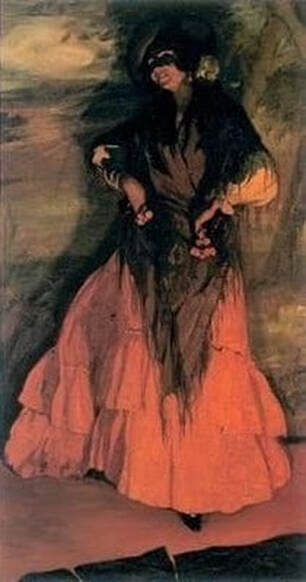|
Spanish Dancer As in one’s hand a sulfur match, still white, before it flares, sends out on every side small, twitching tongues, so, ringed by a close crowd of watchers there, her round dance—hasty, bright, and hot—begins to flicker and spread out. And suddenly it’s utterly on fire. With just a glance she sets alight her hair, and all at once with daring art she whirls all of her dress into this fiery blaze, as from the flames, like startled serpents, spring her naked arms, roused up and clattering. And then, as if the fire were running low, she sweeps it all up, tosses it away haughtily, with a gesture of disdain, and stares: it lies on the ground there, raging on, and blazes still, refusing to concede. And yet, triumphant, sure, and with a sweet and gracious smile, she raises up her head and stamps it out with small, emphatic feet. Rainer Maria Rilke, translation by Susan McLean ** German: Spanische Tänzerin Wie in der Hand ein Schwefelzündholz, weiß, eh es zur Flamme kommt, nach allen Seiten zuckende Zungen streckt -: beginnt im Kreis naher Beschauer hastig, hell und heiß ihr runder Tanz sich zuckend auszubreiten. Und plötzlich ist er Flamme, ganz und gar. Mit einem Blick entzündet sie ihr Haar und dreht auf einmal mit gewagter Kunst ihr ganzes Kleid in diese Feuersbrunst, aus welcher sich, wie Schlangen die erschrecken, die nackten Arme wach und klappernd strecken. Und dann: als würde ihr das Feuer knapp, nimmt sie es ganz zusamm und wirft es ab sehr herrisch, mit hochmütiger Gebärde und schaut: da liegt es rasend auf der Erde und flammt noch immer und ergiebt sich nicht -. Doch sieghaft, sicher und mit einem süßen grüßenden Lächeln hebt sie ihr Gesicht und stampft es aus mit kleinen festen Füßen. Rainer Maria Rilke ** Literal translation: Spanish Dancer As in the hand a sulfur match, white, before it comes ablaze, on all sides stretches out flickering tongues, so, in the circle of nearby watchers, hasty, bright, and hot, her round dance starts to flicker and spread out. And suddenly it is utterly and completely in flames. With one glance she ignites her hair and all at once with daring art whirls her whole dress into this conflagration, from which, like frightened snakes, her naked arms stretch, roused up and rattling. And then, as if the fire were becoming low, she draws all of it together and throws it away very imperiously, with a haughty gesture, and looks at it: it lies there on the ground, raging, and flames still, and does not surrender—. But triumphant, self-assured, and with a sweet, welcoming smile, she lifts up her face and stamps it out with firm little feet. Rainer Maria Rilke, translation by Susan McLean Author's note: "Although it is usually assumed that this poem was inspired by witnessing a dance by a Spanish flamenco dancer, I agree with the argument of Robert Vilain that it was likely inspired by the painting known as Gitanilla. by the Spanish artist Ignacio Zuloaga, with whom Rilke became friends during his stay in Paris. Vilain's argument and evidence may be found here: https://researchinformation.bris.ac.uk/ws/portalfiles/portal/133223948/GLL_White.Vilain.REVISED.pdf Susan McLean, a retired professor of English, has published two books of her own poems, The Best Disguise and The Whetstone Misses the Knife, and one book of translations of the Latin poet Martial, Selected Epigrams. Her poems have appeared in Measure, Mezzo Cammin, Able Muse, and elsewhere.
1 Comment
Mary A Clark
6/27/2021 04:05:02 pm
This is sparkling translation from what I can tell between the literal English and McLean's version, except for the last two lines where gracious and welcoming are too far apart. It's a beautiful poem.
Reply
Your comment will be posted after it is approved.
Leave a Reply. |
The Ekphrastic Review
COOKIES/PRIVACY
This site uses cookies to deliver your best navigation experience this time and next. Continuing here means you consent to cookies. Thank you. Join us on Facebook:
July 2024
|




